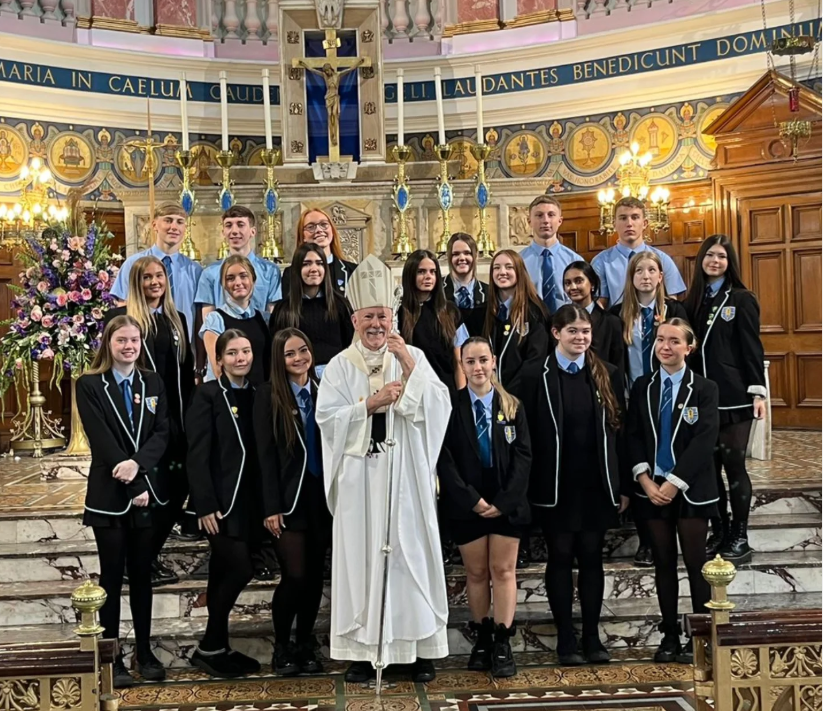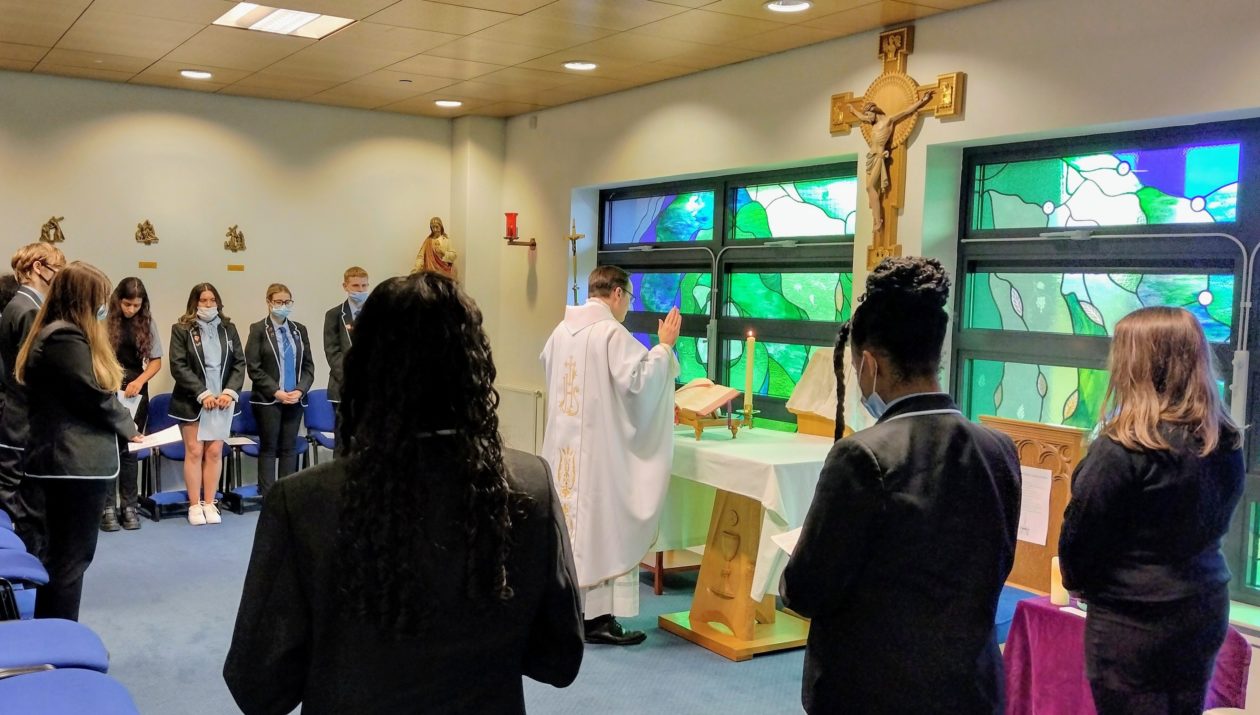Our new Caritas class visited St Mary’s in the Calton for a commissioning Mass with the Archbishop. Miss Morrison, who is leading Caritas from this year, said that the young people represented the school in an exemplary fashion and we hope that this is a sign of great things to come from this year’s group.
Caritas 2023, in their own words
Overall, Caritas has had a big impact on me and aided in strengthening my faith. It has given me the chance to reflect more on my own life and discover new ways of thinking that help me to grow closer to God. It has enhanced my understanding of scripture and the teachings of the Church and even caused me to make new friends. So ultimately, Caritas has been and will continue to be an extraordinary force in my life.
True loving mercy requires complete self-sacrifice, the ability to halt your own life and desires completely in order to help someone else, just as the Samaritan did in the parable. And we have not only to do this with people that we find it easy to love.
The “decisive direction” that the late pope speaks of is of course towards Heaven, and I think that the word “decisive” does give a very accurate description. We can have no hesitancy or doubt in our Faith if we wish to truly live the lives that God wants us to and must have complete trust in God, confident that He will guide us perfectly through the trials of this life and into the next.
“Love and truth are inseparable. Without love, truth becomes cold, impersonal and oppressive for people’s day-to-day lives.” (Pope Benedict XVI) Pope Benedict taught us that in order for truth to be valuable, it must be founded in love – a two-way relationship. Furthermore, the pursuit of truth must always be guided by a spirit of love and compassion. Without love, truth can become unnecessary, harsh or dogmatic, lacking the kindness and humanity that is needed for it to be truly meaningful and positive in people’s lives. The depth added to this idea by things I learned through Caritas is just one of many ways the award has impacted my outlook on things fundamental to my faith.
As Pope Benedict says in Deus Caritas Est: “Love is an act of the will, and it can survive even when the feelings have disappeared.” This can make loving difficult and may even require us to make sacrifices or compromise. The ultimate example of love is the sacrificial love of Jesus, who died on the cross for the sins of humanity. Similarly, we are called to love others without prejudice and even when it doesn’t suit us – even, most radically, to love our enemies.
Knowing myself more deeply has allowed me to consider what I want and what is important in my life, something valuable beyond words at this stage in my life, where I will soon be leaving school and becoming an adult. I know the regular chance provided by Caritas to think not just academically or scientifically but spiritually has helped me tremendously through such a transitory stage in my life.
We may have opinions and perspectives that differ from others to the point that we may consider them enemies, but we need to remember that God created us all in His Own Likeness, which means that we are all Children of God. God has a place for us all in the world, and loves us all unconditionally. If we are to be true followers of Christ, we need to listen to His words and follow His example.
“The expression of love of neighbour is not just an individual responsibility, but something for the whole Church” Pope Benedict
This Deus Caritas Est quote has guided me along my Caritas year to explore the importance of love. It is first and foremost that the obligation of each individual believer is to love their neighbour as themselves, but it is also the responsibility of the entire Christian community at every level, from the local neighbourhood to the specific Church and to the Church universal as a whole. The Church must practise love as a group.
When we love our brother we also love God. We cannot love God and not love our brother because he is the love that God has given us. We love our neighbours because as Christians we follow God. It is crucial to emphasise that the greatest Commandment is to love God with all my heart since, without doing so, I cannot love my neighbour. The ability to love my neighbour as myself depends on how much I love God. Only when I love God is the only relationship that can spill over into other relationships.
I feel we live in a world just now which is extremely materialistic and some people have lost a focus on looking out for others and appear to have a more selfish outlook on life, concentrating on their own needs rather than the needs of others. I feel the Pope’s teaching (Deus Caritas Est) should be taken on board by more people as this would make the world a better place.
“Love grows through love.” This is a quote directly from Pope Benedict XVI and seems simple at first glance when you take it literally….the more I think about it the more amazing it is to me. I interpret it as God saying how he will always love us as we are his children and in order for his light to shine in our lives, we need to open the door and let him in so he can spread his love to us.
With Caritas, I have somewhat put aside the writings of Camus and Sartre and come to more greatly enjoy the Holy Scriptures and writings of Catholic philosophers and theologians. Love may be irrational to our meagre human minds but given the context of God – from whom it comes, by whom we may enjoy it – the Mystery of Love becomes much more perceptible to me. I have come to realise, the call to Love is a calling to be closer to God and to know Him more fully (1 John 4:16). Our love is but a manifestation of God and His love (1 John 4:19).
CEW 2021- Celebrating and Worshipping
The theme for this year’s Catholic Education Week is designed to help us reflect upon how our schools are communities of faith and learning, characterised by our celebration and worship.
We can list many things that make Turnbull High School a distinctively Catholic place of learning, but they are summed up in three phrases that you can see around our school:
- We are a Community of Faith Engaged in Learning. Our Catholic faith is woven into all that we do from starting the school day with prayer to seeking to discover truth, beauty and goodness, the finger prints of God, in every subject that we study.
- We are Centred on Christ. This is not just a phrase that is mounted above the main entrance, but reflects our desire to witness to our faith in the Lord Jesus by living the sacramental life, by sharing a life of prayer and by reaching out to others in and beyond our community. Our Oratory is on the middle floor of the school and so Jesus in the Blessed Sacrament is close to us in all we do and living our consecration to the Immaculate Heart leads us to follow the Lord more faithfully.
- Our motto is Respice Finem– Look to the Goal. At Turnbull we have the opportunity to receive a spiritual and academic formation which prepares us for our short term aims- our exams, further education, careers and vocations but also for our ultimate goal which is to know love and serve God in this life and be forever happy with him in the next. We are a centre of the New Evangelisation which seeks to proclaim and witness to the Good News and walk in the path of discipleship.
The circumstances of the last two years have posed real challenges for so many in our schools, parish and wider communities. We saw the closure of our schools and parishes, and worked through the tentative attempts to reopen or to reimagine how we could function safely in an ever-changing landscape. Celebrating our Faith and Worshipping God have taken on new forms at Turnbull High School. We have responded to the difficulties around assisting at Holy Mass by exploring the richness and variety that is to be found in our Catholic devotional heritage. Online and in person we have rediscovered the power of the Holy Rosary and Novenas, the stillness of Eucharistic Adoration and the richness of Letio Divina.
In the preface to the weekday Mass we find these beautiful words:
Father all-powerful and ever-living God,
we do well always and everywhere to give thanks.
You have no need of our praise,
yet our desire to thank You is itself Your gift.
Our prayer of thanksgiving adds nothing to Your greatness,
but makes us grow in Your grace,
through Jesus Christ our Lord.
We see here that there is never a wrong time to turn to God in prayer and worship. There is never a wrong time to celebrate his unending love for us. Those words from the preface remind us that the purpose of celebrating and worshipping is to Adore God and to be Reconciled to him. ‘Ad Ora’ means to mouth and so to Adore God is to turn to him and be filled with the breath of life as was Adam in the garden. Giving thanks and praise is not only right and just but is the realisation of our destiny as beings made in His Image.
The Latin root of ‘Reconcile’ comes from the word for eyelash, meaning that by turning away from sin and towards the face of God through the sacraments, we are drawn into the most intimate of relationships with our creator. Indeed, in so doing, we strengthen our relationship with God, our loving Father, and with our brothers and sisters in Christ with whom we celebrate- ‘and to you, my brothers and sisters to pray for me to the Lord Our God’ We are made to know, to love and to serve Him; it is here that we find our purpose, and we can do that through joining together in celebration and worship.
This is why the prayer and sacramental life of our school is absolutely central to who we are and to how we grow as a community. It is also why the links we have with our parishes are so important to us.
Today, on behalf of all the pupils of Turnbull High School we would like to thank you, our family, friends and follow parishioners, for your support and prayers as we continue to encounter Jesus and discern God’s dream for our lives. We also offer our prayers for you who are united with us in Celebrating the Good News and Worshipping God on our pilgrimage through this life towards our ultimate goal.
All Saints Day 2021
It was a delight to celebrate All Saints’ Day with our young people again this year. Period 3, BGE pupils participated in a live-streamed Mass from St Andrew’s Bearsden and period 5 SP pupils participated in Mass streamed from our own Oratory.
The Caritas class read beautifully and the atmosphere of reverence was touching. Sometimes teachers don’t get to pray so much as supervise but yesterday it was a privilege to pray alongside our young people who participated with such love and respect.
National Pilgrimage at Carfin Grotto
On the 5th of September 2021, the Catholics of Scotland descended on the National Marian Shrine, Carfin Grotto. The National Pilgrimage is an annual Mass with the Bishops of Scotland which had been cancelled due to Covid and it was a joy to see families, religious and clergy arriving by the bus load. A delegation from our Caritas class attended the event as they always do, and seemed to be the only school group in attendance. The pupils were struck by the variety of the church in Scotland beyond their own parish experience and were impacted by the presence of the bishops- our living connection to the apostles.
CREDO Club 2021
For years, an important part of our school community has been our lunchtime charity clubs. These clubs have not only been an important part of keeping the Catholic ethos alive within our student body, but it has also had a big hand to play in bringing pupils together, teaching them important leadership, organisational and communication skills, inspiring a charitable and compassionate spirit within them and educating them on worldwide issues and the importance and how we are all affected by them spiritually.
Unfortunately, these lunchtime groups were put on hold due to lockdown and then new COVID-19 related restrictions caused numbers to dwindle, and it seemed that some of them would be discontinued. However, thanks to an ingenious idea by Mr Pearce, head of RE, all the clubs would continue, as CREDO.
The name CREDO comes from the first line of the creed, and means ‘I believe’, and the club consists of previously independent clubs within the school. The club is made up of four departments: Aid to the Church in Need, Mary’s Meals, Baby Steps and The Holy Events department. Aid to the Church in Need’s mission statement is to help lift the oppression of Catholics all around the world, and famously holds the Red Wednesday Bakesale every year. Mary’s Meals’ mission statement is to promote education in underprivileged countries by feeding children at least one meal a day at school and has also been successful in twinning our school bathroom with another school bathroom in Liberia. Baby Steps is the only new and original club- it’s a Pro-Life club which aims to support pregnant mothers by doing things such as donating or fundraising for important items like baby clothes.
Finally, The Chaplaincy department helps organises events within the school, like important Masses or the recent S1 retreat. The different departments within CREDO are all run by the S6 Caritas pupils, and all are supervised by Mr Pearce. The club takes place on Tuesday lunchtimes for BGE pupils, while beforehand the S6 pupils prepare activities for the younger pupils during their earlier lunch break. New members are always welcome if you want to support the school ethos and learn more about Catholicism worldwide!
Murron, S6
The Grotto at St Dominic’s – A Focal Point for Faith
The Grotto at St Dominic’s – A Focal Point for Faith
The Grotto has been a gathering point at St Dominic’s for 5 years now but has grown significantly in importance since the presence of lockdowns. Since COVID hit in the UK in March 2020, places of worship have been closed and parishioners have been unable to gather as a community to practice their faith, so the Grotto has been a focal point for people to stay connected to their religion. The grotto has been a peaceful place for parishioners to safely visit in these times and provides an outlet to reflect, pray and seek the intercession of Mary. There is a serene atmosphere surrounded by plants and benches to allow people to sit and worship the statue of Our Lady. It allows people to feel secure in an environment surrounded by faith in a time when gathering in solidarity is exceedingly difficult.
5 years now but has grown significantly in importance since the presence of lockdowns. Since COVID hit in the UK in March 2020, places of worship have been closed and parishioners have been unable to gather as a community to practice their faith, so the Grotto has been a focal point for people to stay connected to their religion. The grotto has been a peaceful place for parishioners to safely visit in these times and provides an outlet to reflect, pray and seek the intercession of Mary. There is a serene atmosphere surrounded by plants and benches to allow people to sit and worship the statue of Our Lady. It allows people to feel secure in an environment surrounded by faith in a time when gathering in solidarity is exceedingly difficult.
The focal point of the Grotto is the statue of Our Lady, so anyone that comes to the grotto stops to worship and appreciate it. Many people visit every day, each with individual reasons. Some people visit the grotto whilst out a walk with family or friends and sit together to pray whilst adoring the statue of Mary. This gives people a holy destination to visit together and encourages families to take time out of their day to unite in faith. Others visit the grotto alone to pray the rosary at the foot of Mary, or to say their own prayers which hold importance to them. When asked about the impact of the availability of the grotto to people in these times, Fr Monaghan, Parish Priest of St Dominic’s, said “When people are unable to come to Mass the Grotto has become a focal point for prayer and also a mini pilgrimage place when people are out for their walks. People desire to be close to Jesus and by faith we know Mary takes us to her son, so they readily come to pray to Mary whom the Grotto is dedicated to.” It has been clear that the Grotto has encouraged people through these difficult times and the community have clearly appreciated and valued having a place to go to be close to God, whether they quickly stop and pray whilst passing by, or sit down and fully indulge in the serenity of the surrounding nature and presence of Mary.
In times of social distancing, face masks and staying at home, the feeling of solidarity is more difficult to find than ever, but also more important. Even though St Dominic’s church may not be open, the Grotto outside can give people a feeling of familiarity and consistency as it can be a place for people to visit daily, to remind them that although the world is full of uncertainty right now, God will always be constant in their life. Another aspect of the grotto that helps to achieve this feeling of unity, is the online devotions that Fr Monaghan leads from it.
Fr Monaghan has been leading online devotions from the Grotto which has helped to allow people to practice as a community and be together virtually to engage in prayer. This also means people can visit and appreciate the grotto without physically visiting it, if they are unable to for any reason. The online devotions are a new addition to the practice of the church but have been valuable and brought a more fruitful experience of the faith during these unprecedented times. Fr Monaghan has received a lot of positive feedback regarding the online devotions, “Parishioners tell me that when they get the message on their phones that there is a livestream they stop what they are doing and join in the prayers. It also gives a moment for the parishioners to greet each other online and in the messages.” This makes it evident that the people joining in the live streams appreciate the extra efforts of Fr Monaghan to keep the faith alive during the lockdowns and to make everyone feel like they are practicing together as a community united in faith, and also gives people hope that they will get to be together physically in church again one day.
Fr Monaghan offers different services online from the grotto, or from home if necessary, and people are eager to join in. He livestreams Mass which people can watch real time or can watch later on. He also leads a decade of the Rosary from the grotto which people can join in, a different mystery of the rosary is usually prayed each session to allow people to follow along easily and clearly, in the midst of their daily lockdown life. Other relevant prayers are often said too, such as prayers for the Faithful Departed. These devotions are often done on feast days, for example a rosary was led from the grotto on the feast day of Our Lady of Fatima. Fr Monaghan also added prayers to the Sacred Heart of Jesus in the month of June as this is the traditional devotion for this month. All of these different services contribute to the quality of the practice of faith from home, and each one brings parishioners closer to God.
Overall, the Grotto has kept people connected to their faith during these lockdowns and has provided a central area for people to dedicate their time for reflection and prayer in a time when maintaining a strong relationship with God is so important.
By Rachel and Rose, S6 Caritas Award

Caritas Award 2020 & Religion, Beliefs and Values
A huge congratulations to our S6 pupils who achieved the Pope Benedict Caritas Award this year! Through their faith learning, faith reflection and faith witness activities, the young people also gained the SQA Religion, Beliefs and Values Level 6 certificate.
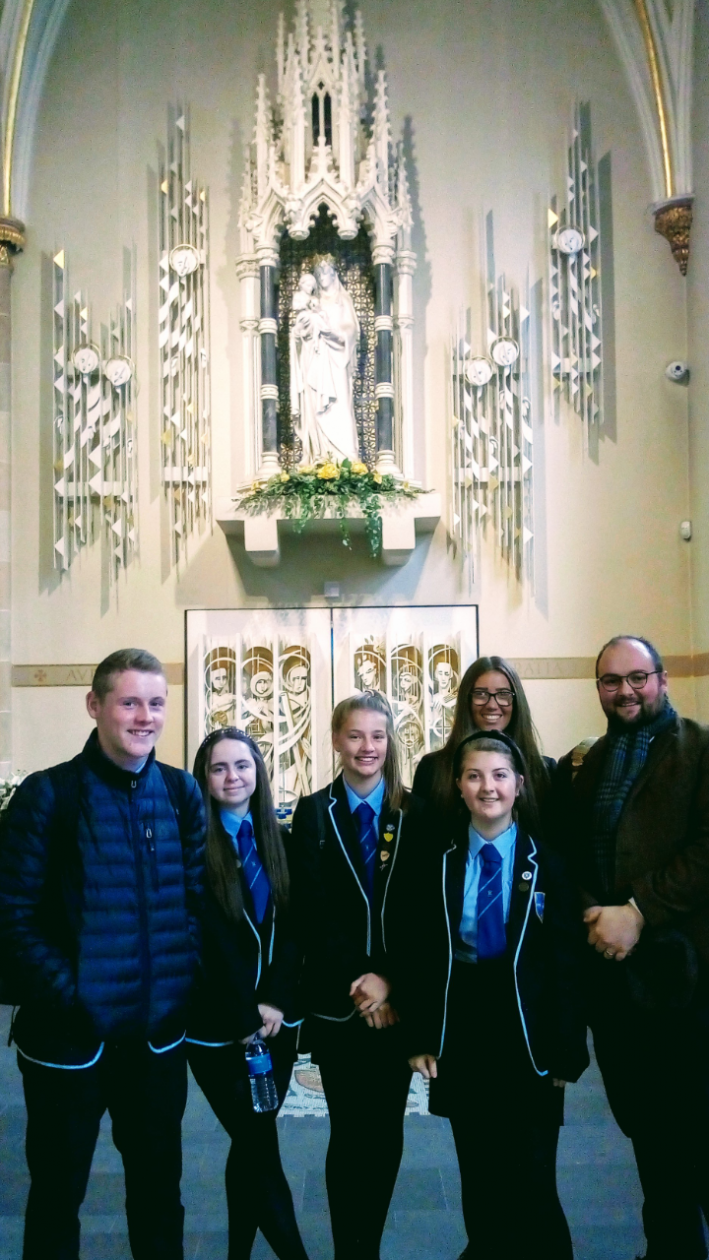


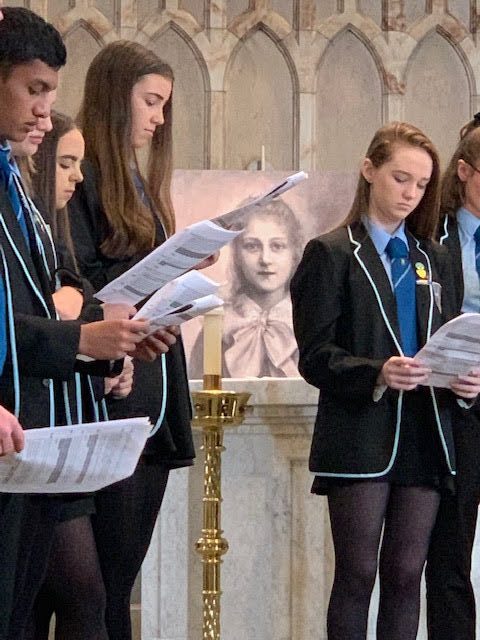
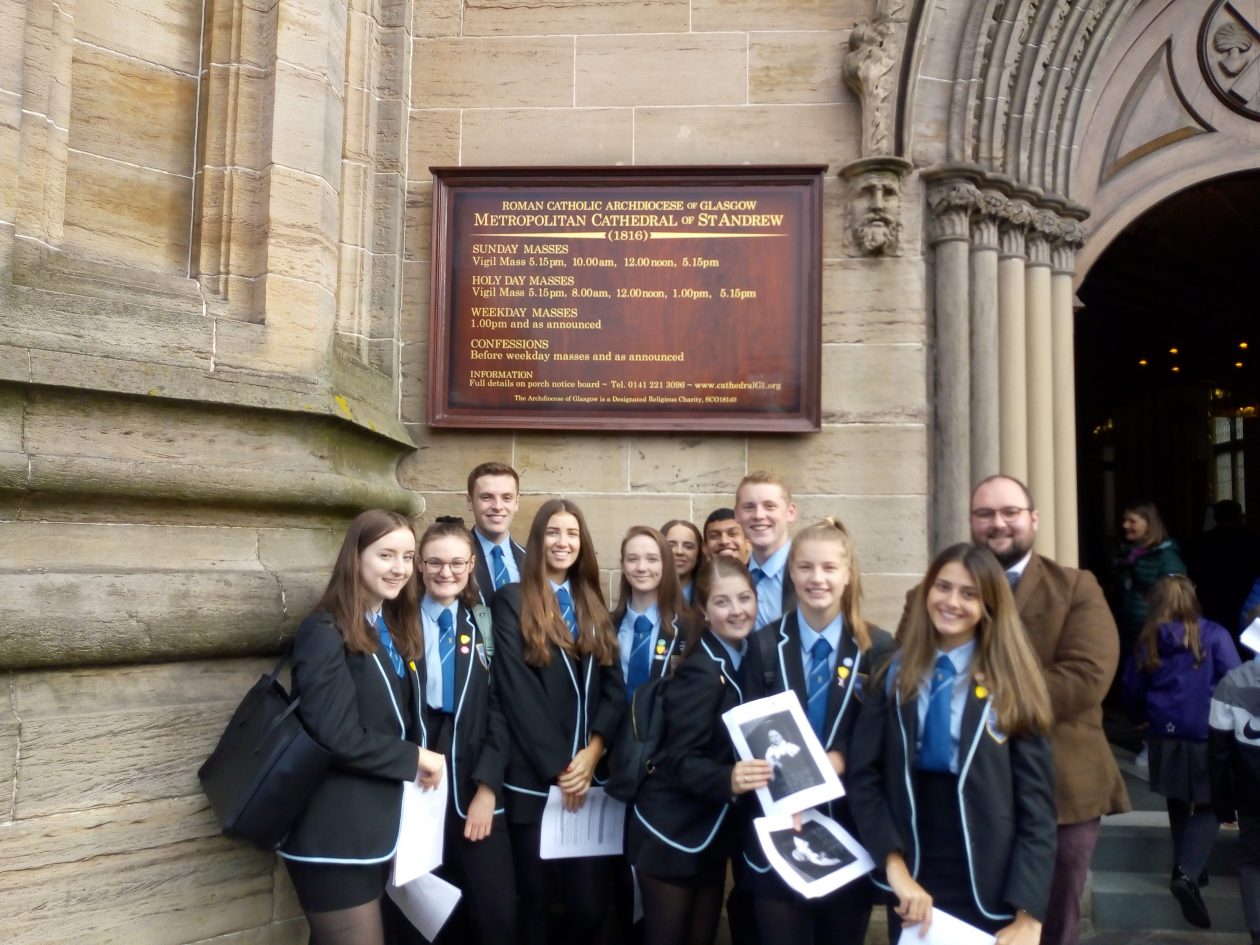
2020 is also the first year that the RE department has entered pupils for the SQA Religion, Beliefs and Values level 4 certificate. This enables pupils to to gain accreditation and an additional qualification with their exam results in S4 by completing our S3 course. We will be developing elements of our RBV programme this year and aim for every pupil at Turnbull achieving the award at Level 4 and all Caritas pupils achieving Level 6- Academic and Spiritual formation enriching one another.
Mr Pearce


